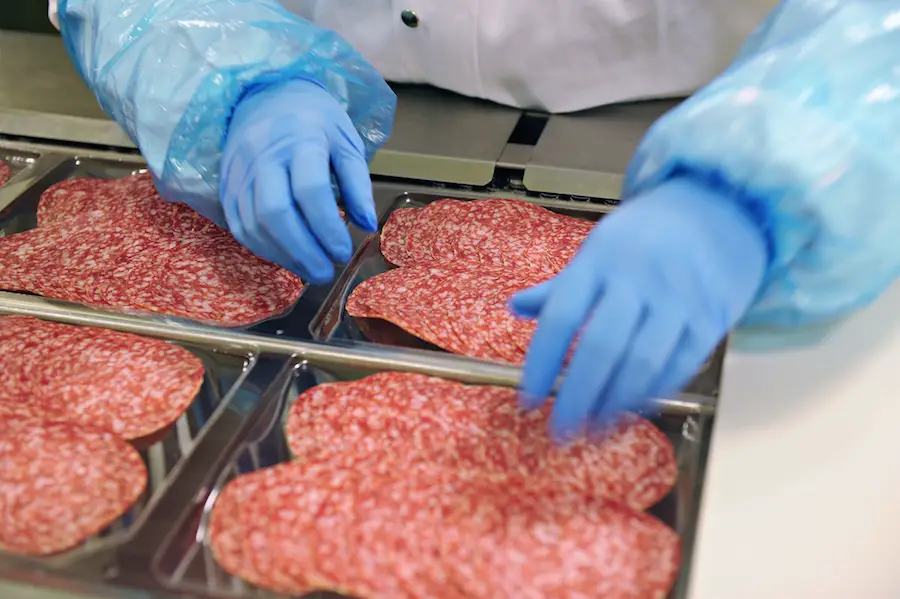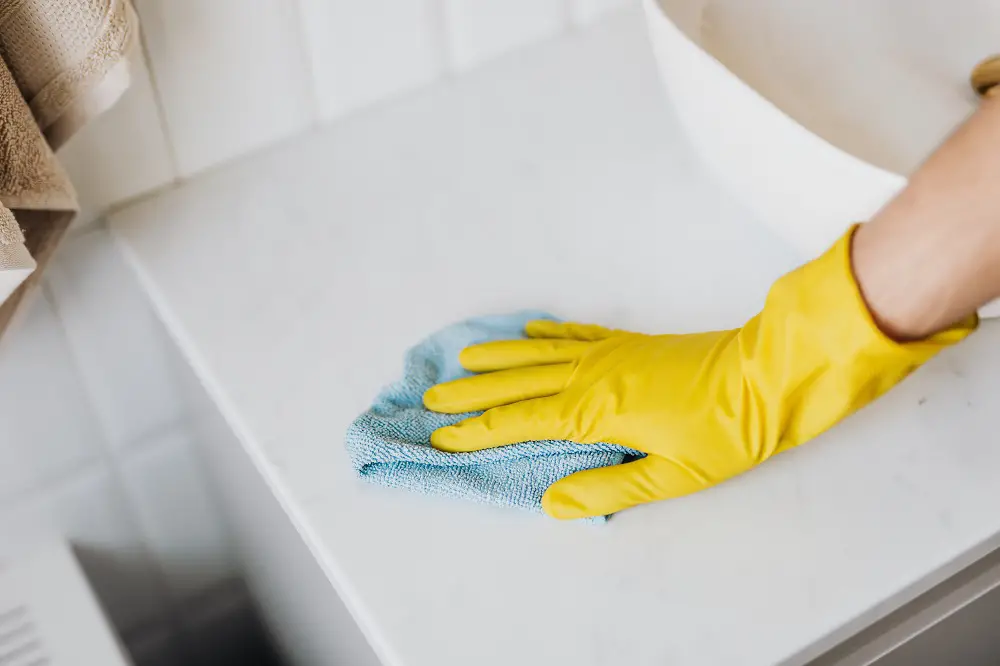Vinyl is a non-biodegradable, protein-free synthetic substance derived from polyvinyl chloride or most commonly known as PVC.
Vinyl gloves have a longer shelf life than latex gloves, which generally degrade over time since they are synthetic and non-biodegradable.
It is incredibly cheap to produce, thus the gloves are quite cheap to buy. Vinyl gloves, like latex, come in a variety of thicknesses and powdered or unpowdered alternatives.

Because of their low cost, vinyl gloves have been a popular choice for the food industry for decades. However, the uses for vinyl gloves extend far beyond simple food preparation, and the advantages outweighs the costs.
Although vinyl gloves are not as sturdy and durable as nitrile or latex gloves, they are commonly used in food handling, food preparation, low-risk health care applications, light cleaning or manufacturing duties.
Because of the minimal amount of protection provided, these gloves are typically used in non-hazardous circumstances and low-risk infection conditions. They are ideal for use in the food and beverage industries.
Let us get into details about how and where vinyl gloves are used
1.) Cleaning and care work
Vinyl gloves are an excellent choice for low-risk cleaning chores that do not entail contact with dangerous materials such as strong chemicals but require contamination protection from infections and human fluids.

Vinyl gloves protect cleaners and caregivers from low-risk chemicals such as detergents and cleaning agents, as well as aiding in the prevention of contamination from human fluids commonly encountered in care work.
2.) Food preparation
With the exception of greasy or fatty meals, vinyl gloves certified to BS EN1186, are regarded as safe for contact with food.
They are a cost-effective alternative for jobs that need the removal and disposal of gloves on a frequent basis, such as customer-facing food service positions.
You must be wondering what this BS EN1186 certification is?
Gloves that have passed BS EN1186 testing are certified as safe to use with edibles, as well as with or around food stuff, which might encompass everything from chopping boards to food-containers and packaging, to utensils and catering equipment.
The purpose of this test is to manage the release and transfer of trace levels of plastics or chemicals on food and foodstuffs that may be hazardous to human health. (https://www.just1source.com/2020/08/05/understanding-bs-en1186-food-safety/ )
3.) Healthcare and cleaning jobs
Medical-grade vinyl gloves differ from conventional vinyl gloves in terms of minimal AQL (Acceptable Quality Limits) and are certified suitable for use in environments where biological dangers are present.
Healthcare and labor, hygiene and dental, beauty services, and tattooing are examples of such occupations.
4.) Painting or printing purposes
Where it’s necessary to protect hands from potential discoloration from paints and dyes, vinyl gloves make an excellent choice. They provide a high level of protection for both hands and materials whilst being quick to don and remove.
Benefits of vinyl gloves
1.) Cost-effective: They are the most cost-effective option since it is the cheapest alternative available. Vinyl gloves are frequently used in the food business.
These disposable gloves are less durable and the least expensive alternative for circumstances requiring flexibility and simplicity of use but not as much durability. It’s no surprise that they’re so popular, they’re inexpensive and beneficial in a variety of sectors.
2.) Flexible: Vinyl gloves are constructed of PVC, polyvinyl chloride, which is then combined with a plasticiser to make them more flexible and wearable. Vinyl gloves, unlike nitrile gloves, are free of chemical accelerators too.
3.) They are water, oil, and grease repellent: Vinyl gloves can be useful for medical jobs, food handling, chemical and oil industries, and painting operations.
They are good in protecting against oily substances, acids, emulsions, and other liquids, and they are useful in food preparation when cross contamination must be kept to a minimum.
4.) Suitable for non-hazardous materials and low-risk jobs: Vinyl gloves are best suited for low-risk tasks. They should be avoided in areas where hazardous products are being used.
Vinyl gloves are lightly coated with powder, such as cornstarch, making them simple to put on and remove when your work is complete.
5.) Anti-static in nature: They are especially beneficial while working with wires and cords due to their anti-static properties.
Static electricity may be generated while stripping back sheaths on wires with tools, therefore these gloves are excellent for preventing hands from chafing.
6.) Free of latex, protein, and allergens: Vinyl gloves are latex-free and hence acceptable for anyone wearing protective gloves who may be allergic to latex.
They are a good fit for the majority of people and give increased mobility so that hands may move freely, allowing most jobs to be completed efficiently.
Since we have seen the advantages of vinyl gloves, let us now talk of the disadvantages of it-
1.) They’re less durable and flexible as compared to nitrile gloves.
2.) Protection from biomedical exposure is limited.
3.) Puncture and cut damage are possible.
4.) Low amount of protection.
5.) Less elastic and a looser fit.
6.) Bacteria and virus penetration is increased in vinyl gloves.
7.) Because vinyl gloves are less flexible and elastic, they do not fit well.
Vinyl gloves as compared to nitrile and latex gloves
| Gloves | Fit | Allergic reaction | Cost | Properties | Quality | Durability | Uses | Wear and tear |
|---|---|---|---|---|---|---|---|---|
| Vinyl | It has a looser fit. | Non allergenic because it is latex free. | Most economic alternative. | Anti-static in nature. | Low touch sensitivity. | Not as durable as its competitors. | Are appropriate for short-term, low-risk jobs. | Prone to wear and tear faster. |
| Latex | Fits comfortable like a second skin. | Allergenic in nature. | Cost effective. | Very elastic and strong. | Touch sensitivity | Very durable. | They are effective in high-risk circumstances involving infectious substances. | Has good wear and tear resistance. |
| Nitrile | Fits comfortably. | Non allergenic because it is latex free. | A little expensive. | Are exceptionally puncture resistant. | Sensitivity | Extremely durable. | The best option for high-risk circumstances including infectious materials, toxic and abrasive chemicals. | Has excellent wear and tear resistance. |
Conclusion
Depending on the use, environment and allergies, you can opt for vinyl gloves if they’re appropriate for the task. As long as the job doesn’t involve any hazardous substance that can permeate through the glove material, you’re good to go with a vinyl glove.
Consider how much better the work would be accomplished by choosing flexible, adaptable vinyl gloves the next time you’re doing food prep or want to order some gloves to protect your hands while conducting duties like low risk healthcare occupations.







